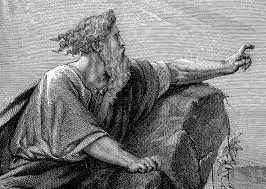I am a Rock
וִידֵ֤י מֹשֶׁה֙ כְּבֵדִ֔ים וַיִּקְחוּ־אֶ֛בֶן וַיָּשִׂ֥ימוּ תַחְתָּ֖יו וַיֵּ֣שֶׁב עָלֶ֑יהָ וְאַהֲרֹ֨ן וְח֜וּר תָּֽמְכ֣וּ בְיָדָ֗יו מִזֶּ֤ה אֶחָד֙ וּמִזֶּ֣ה אֶחָ֔ד וַיְהִ֥י יָדָ֛יו אֱמוּנָ֖ה עַד־בֹּ֥א הַשָּֽׁמֶשׁ׃
“But Moses’ hands grew heavy; so they took a stone and put it under him and he sat on it, while Aaron and Hur, one on each side, supported his hands; thus his hands remained steady until the sun had set.” Exodus 17:12
Sometimes, I find myself in the Torah. It helps that my name, Evan, is the Hebrew word for “stone.” Stones are versatile symbols in scripture—sometimes marking graves, other times serving as makeshift pillows. In this passage, the stone becomes a seat, enabling Moses to provide leadership despite his fatigue. I am a rock.
Among the many models of leadership offered in the Torah, the scene in Exodus 17:12 stands out for its emphasis on collaboration. As the Hebrews faced battle against the Amalekites, victory hinged on Moses’ raised hands. When he grew weary, a stone was placed under him so he could sit, and Aaron and Hur supported his hands. This collective effort ensured that Moses’ hands remained steady until the battle was won.
How do I see myself in this story? As an Evan—a stone—I imagine myself as the simple, likely rough seat that Moses relied upon. I am neither a throne nor a luxurious cushion but a humble, solid support found on a wilderness hillside. And yet, in this moment, I am one of the heroes of the story. The stone, though unsung, is essential to the collaboration that leads to victory.
This episode teaches a profound lesson about leadership: it is a shared endeavor. Success, whether in battles or in life’s smaller struggles, requires the combined efforts of many. Everyone has a role to play. We can choose to be supportive of our leaders, offering strength and steadiness, or we can be mere bystanders—silent as stones. Yet it is crucial to recognize that not all leaders are worthy of support. The Amalekites had leaders too, but their legacy is one of brutality and defeat.
Alternatively, this story reminds us that providing quiet and steadfast support to others is a holy act. It is not always glamorous, and it may go unnoticed. But without the foundation of those who show up reliably and selflessly, families and communities would falter. When we feel unappreciated for our efforts, the Torah gently reminds us that good outcomes often depend on the strong, silent support of those who form the bedrock of our lives.
The model of support here is as humble as a stone and as solid as a rock. While the titular leader may receive the praise, equal appreciation is due to the footholds and boulders upon which they rest. As the stone, we may not always receive gratitude, but the holiness of helping is its own reward—a key element in sustaining a better, more compassionate world.
Rabbi Evan J. Krame




 Evan J. Krame was ordained as a rabbi by the
Evan J. Krame was ordained as a rabbi by the